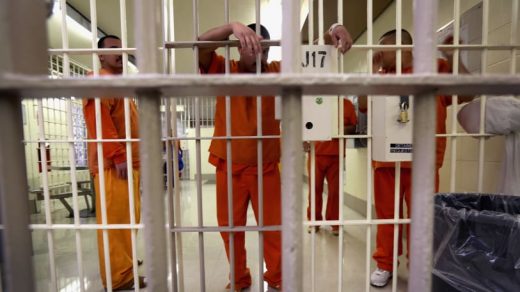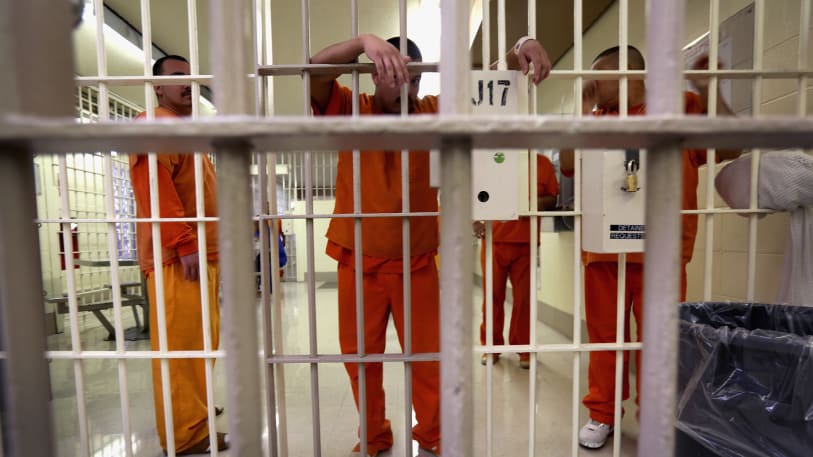In Immigrant Jails, Health Care Can Be Hazardous To Prisoners’ Health
Capital & Main is an award-winning publication that reports from California on economic, political, and social issues.
The United States runs the largest immigration detention system in the world and it’s set to grow dramatically due to the Trump administration’s crackdown on illegal immigration, promising huge profits for the private prison industry that houses the majority of detainees. There are an estimated 35,000 undocumented immigrants in the custody of Immigration and Customs Enforcement on any given day. The system’s size has nearly doubled in the past 15 years and, last week, Congress reached a budget deal that will make it even larger, funding more than 5,000 additional beds.
This growth is a coup for for-profit private prison companies, which house more than two-thirds of ICE detainees, but especially for CoreCivic and the GEO Group, the two largest such companies. More people in detention mean greater profits for both CoreCivic and GEO, which have recruited former high-ranking government officials to top posts and spent millions to lobby Congress and federal agencies. On Monday, news broke that ICE deputy director Daniel Ragsdale will soon step down to take a position at GEO. The company previously hired Democratic operative Anthony Podesta to lobby Congress and the Department of Justice on DOJ and Board of Prisons appropriations, while Thurgood Marshall Jr., a former Clinton administration official and son of the Supreme Court Justice, sits on CoreCivic’s board of directors.
Immigrant rights advocates, however, argue that the system can’t handle additional detainees because, they contend, medical care in detention is already dangerously inadequate. This week, Human Rights Watch and Community Initiatives for Visiting Immigrants in Confinement (CIVIC), released a report, Systemic Indifference, that documents preventable deaths and risky conditions for people who get sick in detention. Among the cases the groups cited:
- Manuel Cota Domingo, 34, died of heart disease, untreated diabetes, and pneumonia in 2012 while in custody in an Arizona CoreCivic facility. He was taken to a hospital eight hours after he reported trouble breathing, a delay that contributed to his death, according to HRW medical experts.
- County jail staff in Orange County, New York changed a schizophrenic detainee’s prescription for an anti-hallucinogen to Benadryl, and the man was placed in what amounted to solitary confinement for a minor infraction likely related to his mental health.
- ICE detainee Carlos H. (a pseudonym) suffered knee pain for eight months in California after falling in a Yuba County Jail shower. After surgery, Carlos collapsed because he had trouble breathing, after which a licensed vocational nurse failed to check his respiration or blood pressure.
- Also in California, 54-year old Jose L. (not his real name) was working in the kitchen at the GEO Group’s Adelanto Detention Facility, when he fell on his hip and back. His pain was manageable at first, but after several months he could no longer stand for more than five minutes. The facility delayed his visit to a surgeon for a year and a half, a delay that an HRW medical expert found “not reasonable.” The facility’s records don’t show what the surgeon recommended or whether medical personnel at Adelanto followed his recommendations. Also, while in custody, Jose became legally blind in one eye, after the facility repeatedly delayed care for diabetic retinopathy.
Three physicians who consulted for HRW’s report studied the medical records of nine other patients in ICE custody in recent years—the group found that poor care contributed to seven of 18 in-custody deaths from 2012 to 2015, including Cota Domingo’s.
“We’ve uncovered a medical care system that doesn’t provide adequate care for people in detention,” Clara Long, an Oakland-based HRW researcher, told Capital & Main.
The report additionally found systemic problems, including short staffing, unqualified staff, delays or denials of care, grossly substandard mental-health care, poor recordkeeping, and lack of informed refusals of care.
“Because the system is stretched to hold hundreds of thousands of people a year, there are incentives to save money by not providing adequate medical care,” Long said.
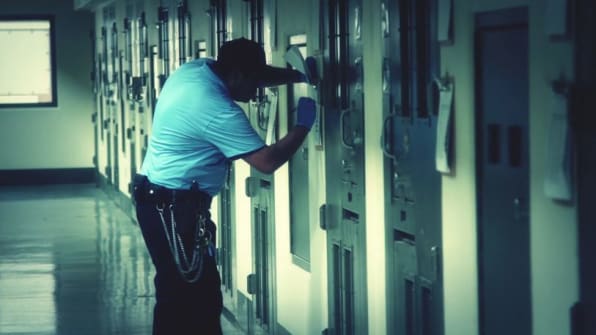
ICE spokeswoman Jennifer D. Elzea responded to the Human Rights Watch report in a statement, noting that ICE spends $ 180 million a year on detainee health care.
“ICE is committed to ensuring the welfare of all those in the agency’s custody, including providing access to necessary and appropriate medical care,” she said, while disputing the report’s findings that ICE doesn’t ensure that health care is adequate in a facility before placing detainees in it, doesn’t sufficiently oversee health care, and doesn’t correct glaring deficiencies, even when they are brought to ICE’s attention.
In California, some 5,000 ICE detainees are held in four county jails (in Orange, Sacramento, Contra Costa, and Yuba counties) and in four ICE detention centers operated by private companies. The GEO group runs the Adelanto Detention Facility in San Bernardino County and the Mesa Verde lockup in Bakersfield. CoreCivic operates the Otay Mesa Detention Facility in San Diego, while a smaller private firm, Management and Training Corporation, runs the Imperial Regional Detention Facility in Calexico.
Health care in ICE detention is delivered by a patchwork of providers whose contract terms, including staffing requirements, vary from facility to facility, HRW reports. The government’s ICE Health Services Corps (IHSC) provides care in slightly less than half of all detention centers, including those operated by CoreCivic. Private prison health care providers cover other detention centers, while detainees in county jails get care from jail health care workers. Human Rights Watch medical consultants found problems with all three types of providers. One consultant, Dr. Marc Stern, who once ran correctional health services for Washington State, told Capital & Main that IHSC is the best qualified to provide care and should take over more of it.
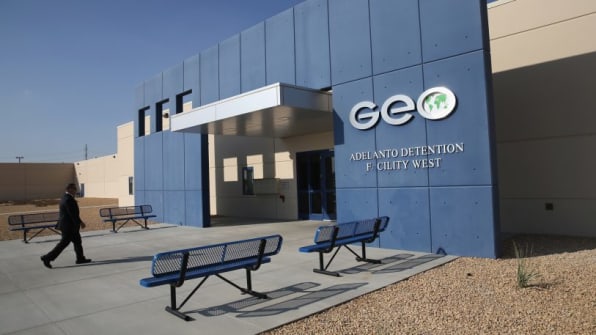
Still, the report concludes that the best solution is to detain fewer immigrants. Immigration detainees aren’t locked up as punishment, but to ensure their appearance for deportation proceedings, and advocates argue they can be adequately supervised in the community at lower cost.
Congress, however, has moved in the opposite direction, despite its action last week to repeal an Obama-era requirement that ICE keep 33,400 detention beds filled at all times. Clara Long contends that its repeal is not likely to reduce the number of people in detention, since lawmakers have already voted to expand the system beyond the former quota.
Neither the Geo Group nor CoreCivic responded to specific questions about the adequacy of the current system and the consequences of its expected expansion. But GEO spokesman Pablo Paez wrote in a statement, “We’re proud of our long-standing record providing high-quality, culturally responsive services in safe, secure, and humane environments.”
In earnings calls to shareholders, however, both GEO and CoreCivic made clear that growth drives income, and growth is determined in no small part by immigration policy. GEO founder and CEO George Zoley noted that a big increase in the company’s profits was partly due to its new 780-bed Georgia facility that is expected to generate $ 21 million annually. CoreCivic CEO Damon Hininger highlighted U.S. Attorney General Jeff Session’s plans to prioritize immigration offenses for prosecution, the administration’s goal to hire additional border agents, and its directive to the Border Patrol to detain illegal border crossers rather than releasing them pending a court hearing.
Indeed, both companies have kept a close watch on Washington, investing large sums to buy influence. Human Rights Watch reported that CoreCivic spent $ 18 million in federal lobbying between 2004 and 2014, while GEO spent $ 4 million. Since then, the pace of GEO’s spending in the nation’s Capitol has intensified, with GEO pouring nearly $ 1.8 million into federal lobbying since 2015, while CoreCivic’s has slowed, albeit spending about $ 3.8 million in the same period.
CoreCivic has relied on a group of D.C.’s most prominent lobbying firms, including Democrat and Republican operatives, for more than 15 years.
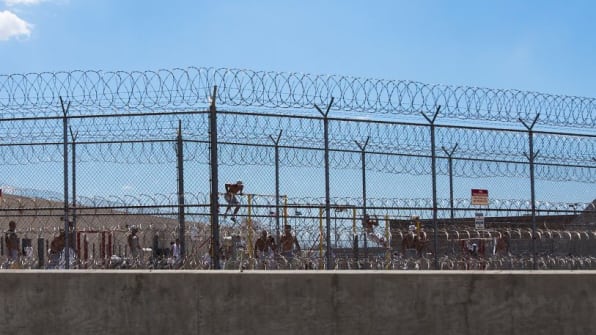
GEO, however, appears to have spent more strategically, depending on who held power. Last January, when President Trump took office, GEO turned to Brian Ballard and Dan McFaul, both of Ballard Partners, a Florida firm that had just expanded into Washington, D.C. Ballard was a Trump fundraiser and served as a lobbyist for Trump in Florida. McFaul worked on Trump’s presidential transition team, vetting appointees for federal agencies, the military, and intelligence posts. David Stewart, who was an aide to current Attorney General Jeff Sessions when he was a senator from Alabama, began lobbying for GEO in the fall of 2016. Stewart, who works for the Alabama-based firm Bradley Arant Boult Cummings, lobbies for the company on Homeland Security funding and private prison contracting, among other issues.
In addition to advocating in the halls of power, the companies have taken advantage of a briskly revolving door between government and industry to bolster ties with the agencies that hire them. In addition to Ragsdale’s hiring, former ICE director Julie Myers Wood, who served in the George W. Bush administration, sits on GEO’s board. The man who leads GEO’s business development efforts is David Venturella, who headed ICE’s deportation and detention operations before joining the company in 2012. Both companies include leaders who formerly helmed the Federal Bureau of Prisons—Norman A. Carlson is a GEO director emeritus, and Harley G. Lappin is a top CoreCivic executive. CoreCivic’s board of directors also includes Stacia Hylton, who headed the U.S. Marshal’s Service during Barack Obama’s tenure in the White House.
With the release of the Human Rights Watch-CIVIC report, Long said she hopes Congress will also hear her group’s call for less detention, even as big lobbying dollars amplify the voices of those who want more.
“I hope it spurs Congressional representatives to push back against President Trump’s budget request for expanding detention, to require better oversight and better transparency, but above all to detain fewer people,” Long said.
(28)

